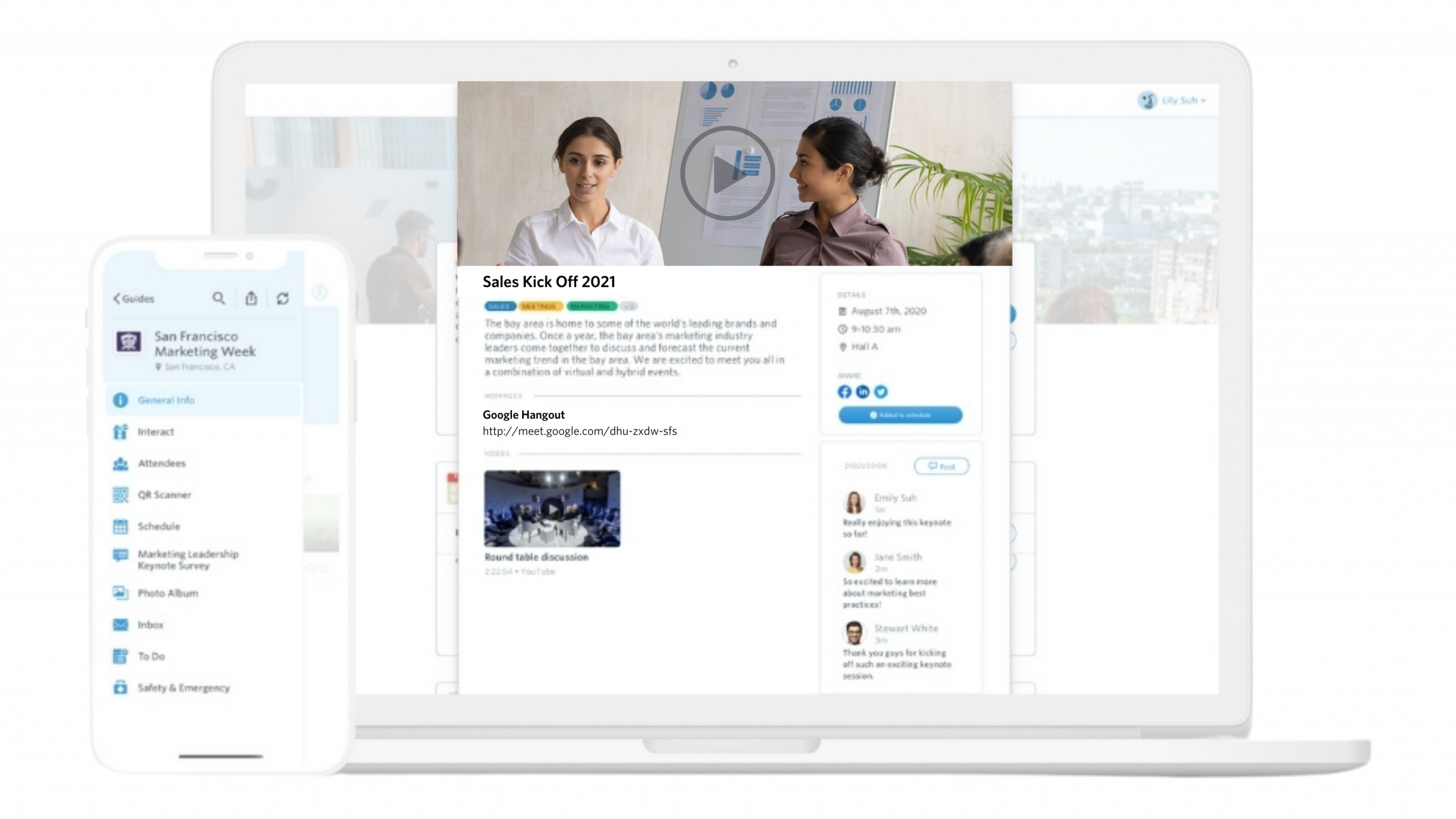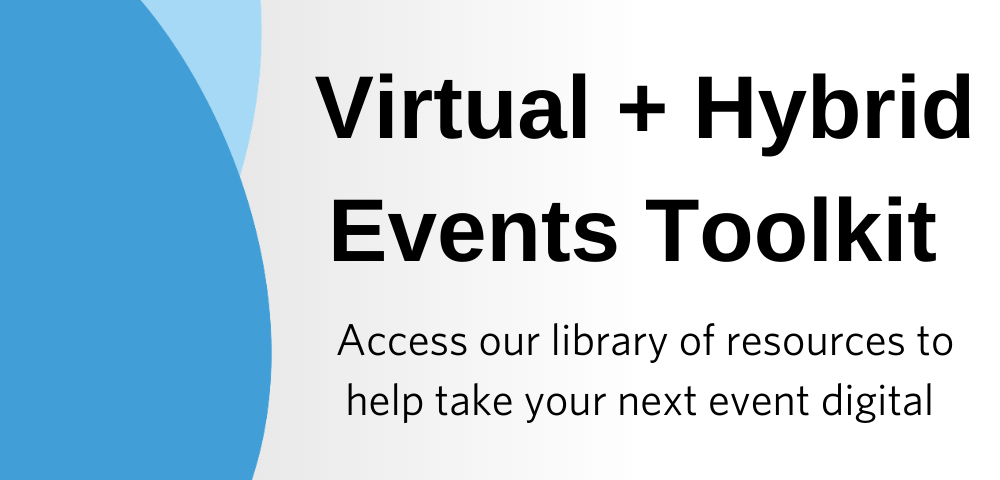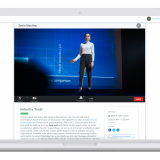Comparing Virtual Events and Webinars
Over the last year, we’ve seen events large and small change format and move online. Conferencing and webinar platforms were huge in helping organizers reach their audiences. However, as the impacts of the global pandemic continue, we’re starting to look at how we can make the most of our time in front of our screens with virtual events.
In 2020, 73% of planners have been able to successfully pivot their event to online
EventManagerBlog
In this article, we’ll look at the differences between webinars and virtual events – and help you identify what’s right for you.
What is a webinar?
Webinars are live online content presentations. Webinars can enlist a single presenter or a lineup of panelists, or anything in between. Webinar platforms offer limited educational presentations during which participating viewers can submit questions and comments.
What makes webinars effective is that they’re a two-way form of communication where the attendees and presenters give, receive, and share information with each other, in real-time. Webinars are an invaluable tool in connecting organizers with remote audiences.
What is a virtual event?
Like webinars, virtual events take place online rather than bringing people together in person. And while the terms virtual event and webinar are often used interchangeably, true virtual events offer attendees an interactive experience that goes beyond that of webinars.
Virtual events can range from small group gatherings and group sessions to large-scale conferences with thousands of attendees. While virtual events are not new, we’re seeing more organizers seek engaging virtual event platforms to replicate the in-person experience.
Want to learn more about virtual events? Check out our Ultimate Guide to Virtual Events.
Virtual events present an opportunity for organizers to reach their audiences, without physically bringing them together during this time of social distancing. More than half (51.5%) of event planners polled by Event Manager Blog say the inability to match live engagement is the most frustrating thing when it comes to virtual event tech. For many, the challenges of using a webinar or conferencing technology alone did not meet their needs for hosting an engaging virtual event.
While webinars have been a helpful tool in connecting organizations with their audiences, we’ve seen a need for virtual events that go beyond a video stream and offer a truly engaging virtual experience.

Is a virtual event right for you?
Until recently, webinars were the go-to for online events, but how do you know if you should move to a virtual events platform for your next event? When does it make sense to utilize a virtual event platform? Let’s take a look.
As we covered, webinars are meetings that are held virtually. Designed for large audiences, webinar attendees watch as presenters deliver content through video and supporting content. While webinars are a great tool to broadcast information, virtual events offer immersive environments for attendees to interact with content and one another.
Ask yourself the following questions:
- What are my goals for this event?
- Is engagement important to my goals?
- Do I want to organize an event with a robust program, i.e. multiple session tracks?
- How am I going to provide value to my attendees? Sponsors? Organization?
Virtual event platforms, like Guidebook, provide value to you, your sponsors, and your audience. Let’s look at how:
How do virtual events deliver value?
The biggest difference between hosting webinars and creating an engaging virtual event is the interactivity that platforms like Guidebook provide. Webinar and conferencing platforms focus on, and are experts at the video. Virtual event platforms take webinars a step further.
Virtual event platforms offer more features and flexibility in creating a virtual event environment. With Guidebook, for example, you have complete control over how you set up your event Guide – your event app and website – to best support your audience.
Below, we’ll cover a few of the key advantages of utilizing an event platform to host virtual events.
Audience engagement
Virtual audiences face challenges and limitations. Virtual event platforms address those challenges with interactive event apps and websites for attendees to engage with before, during, and after virtual events. Through features like live chat, polls, surveys, Q&A, photo sharing, and more; attendees feel like involved participants, rather than passive listeners.
Robust event programs
A key feature of virtual event platforms like Guidebook is the ability to organize and offer a robust schedule of events. Organize session tracks, invitation-only sessions, and hold multiple sessions within the greater event. In addition to the ability to present complex schedules, virtual event platforms enable organizers to host supplementary materials like PDFs and links and more.
Additionally, virtual events platforms give your attendees control. Allow your attendees to pick sessions of interest and build a personalized schedule!
Attendee networking
When moving an event online, audience networking must be well thought out and intentional. Because virtual events lose some of the natural networking that comes with in-person events, networking and engagement tools are benefits of leveraging a virtual event platform for online events.
Attendees can create profiles, connect, and participate in discussions with other attendees. Additionally, with virtual events platforms like Guidebook, your attendees can start connecting and networking with other attendees before the event starts!
A virtual destination
80% of corporate sponsors are interested in investing in virtual events.
Travel Daily News
Moving your event to a virtual event platform gives your audience, speakers, and sponsors a destination to explore, network, and learn. While webinar attendees can lose interest during downtime, with a virtual event, attendees can explore event content, engage with sponsors, and more.
With Guidebook Web, build out a robust homepage filled with content that matters to your audience. Include your event schedule, speaker and sponsor information, relevant content, links, and more. Guidebook offers flexibility so you can customize your event site to work for you and your attendees.
Event data and analytics
There is a wide range of metrics that are provided for every app and event site built on Guidebook’s platform. You can use attendee data to produce actionable insights and to measure the success of an event. Additionally, virtual event insights can help to guide future events.
Here are some examples of the metrics you can gather from a virtual event platform:
- Popular sessions. Discover what sessions are the most viewed and added to your attendees’ schedules. Use these insights to tailor future events to your audiences’ interests.
- Video views. Track how many people view session videos. Get a full picture of how many people are interested in various sessions.
- Surveys and polls. Gather feedback directly from your members and leverage this data to support your organization.
- Actions. Track additional user data like mobile app downloads and continued engagement via mobile.

The bottom line
Webinars are great for some situations, but, more and more, we’re seeing organizers move to virtual events with Guidebook once they realize the engagement opportunities missed out on, when hosting a webinar alone.
If you’re looking to host a meaningful virtual event, you’ll need more than just a webinar broadcast. The Guidebook platform makes organizing an interactive online event fun and simple. Pair Guidebook with Zoom, or one of our other integrated conferencing services, and you’ve got an engaging event that’ll give your attendees an enhanced event experience.
Going virtual?
If you read through this article and realized – I think I’m ready for a virtual event! Great! We believe giving your audience an engaging experience brings value to all stakeholders. We’re here to help you transition your event.
Planning for an upcoming event? Get started with one of our templates for free today, or speak with one of our product experts.




